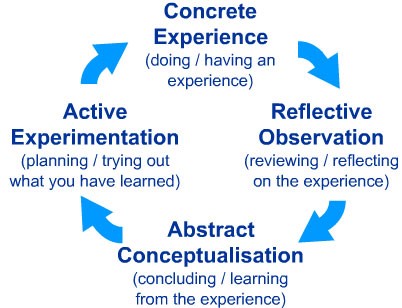Kolb’s approach synthesizes goal-directed and behavior learning theories to create a learning cycle which values process and the ongoing nature of learning. The Kolb learning cycle (Diagram 1) is typically represented by four stages through which the learner repeatedly progresses (McLeod, 2013).
Diagram 1
Kolb’s model highlights the importance of the reflection component in the learning cycle. Reflection allows the student to process what just happened during the experience. In the Reflective Observation stage students can both recount and evaluate their experience. This cataloging provides the information necessary for the next stage: Abstract Conceptualization. At this second opportunity for Critical Reflection, students explicitly link their experience with their preparatory learning, their expectations, and the outcome of the experience. Only through the reflection process can the experience be truly transformational, as the knowledge students carry into the learning activity is evaluated in terms of their personal experience. The final Reflection component for Kolb happens in the Active Experimentation stage. Here, students use reflection to create plans for further learning experiences.
References
Kolb, D.A. (1984). Experiential learning: experience as the source of learning and development. Englewood Cliffs, NJ: Prentice Hall.
McLeod, S. A. (2013). Kolb - Learning Styles. Retrieved from www.simplypsychology.org/learning-kolb.html
